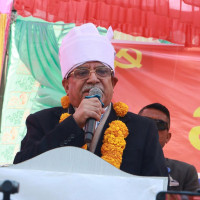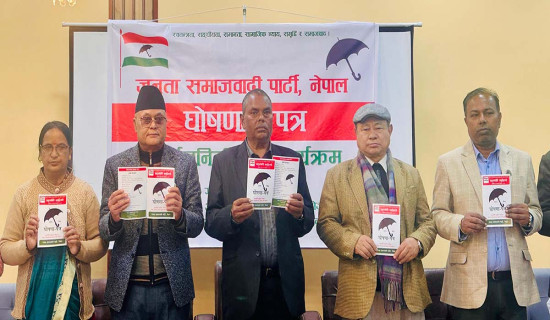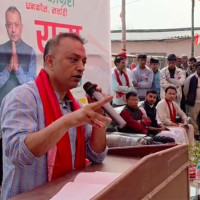- Saturday, 14 February 2026
Give Impetus To Railway Development
The development of railways is on the development agendas of successive governments. In a country like Nepal, railways can be considered a reliable, cheap and safe mode of transport. The importance of railways cannot be overestimated as it can lead to economic growth by stimulating national and international trade and the tourism sector. Even if railways are the artery of transportation, there have been delays in developing railway networks in the country.
Nepal is located between China and India. Both have robust railway networks. China has the second-largest railway network in the world. Its railway network stretches over 150,000 kilometres. Likewise, India has the fourth-largest railway network stretching over 68,000 kilometres. It is a pity that the country has not developed adequate railway infrastructure. Nepal has to depend on India for international trade. The country’s trade is carried out through the Port of Kolkata and the Vizag Port. The development and expansion of railways will, for sure, facilitate not only international trade but also domestic trade.
The first railway service started in Nepal in 1927 AD with the launch of the Amlekhgunj-Raxaul railway. The railway was 47 kilometres long. However, the railway came to a halt in 1965. Another railway, the Jayanagar (Bihar)-Janakpur and Bijalpura (Nepal) railway, came into operation in 1937. The railway was 51 kilometers long. The railway also stopped running about fifteen years ago. But it has since resumed its operations.
International trade
The government established the Department of Railways under the Ministry of Physical Infrastructure and Transport in 2011. The Department is responsible for formulating necessary policies and developing and expanding railways across the country. Even before the establishment of the Department, the government had developed the concept of the railway in 2007 and the project started in 2008. But the works got delayed till March 2020 owing to various economic, environmental and other factors. The railway will be 945 kilometres long and stretch from Kakarbhitta in the east to Kanchanpur in the west. The network is expected to grow up to 4,000 kilometers within 20 years.
Nepal signed the Belt and Road Initiative (BRI) agreement with China in 2017. The signing was a milestone for the country because, under the agreement, the country could develop and expand its railway networks and connect them with international networks. To make the East-West Railway Project a reality, the railway should be connected to Kathmandu. Other important railways on the cards are the Kerung-Kathmandu railway (150 km) and the Kathmandu-Raxaul railway (140 km). It may be noted that China is completing the construction of the Shigatse-Kerung railway, an extension of the Lhasa-Shigatse railway, in this year (2025). The length of the railway will be 540 kilometres.
The Shigatse-Kathmandu railway holds several benefits in store for both Nepal and China. One of the obvious benefits will be further development of the tourism sector. With the railway in place, it will be easier and safer for people from both countries to travel to each other’s countries. Further, international trade between the two countries will be facilitated to a great extent. The existing road and air networks are not sufficient to meet the demands of transport. The country can also import petroleum products from China through the Lhasa-Kerung-Kathmandu railway. It is difficult to import petroleum products from China by road. During the 2015 Indian blockade, the country took the initiative in importing petroleum products from China by road but it proved to be unviable.
The private sector is not willing to invest in railway projects simply because they entail huge costs and risks. So the government cannot look to the private sector for investments in the railway sector. The government should, therefore, take the initiative in mobilising grants or concessional loans from foreign countries or donor agencies. The government can take advantage of China’s BRI framework. China is also ready to extend necessary support to the country in this regard. It would be germane to note that officials of Korail (Korea Railroad Corporation), the national railway operator in South Korea, visited Nepal last week. The government officials and Korail officials held discussions on the development and expansion of railways in the country. Korail has a history of 126 years working in the development and expansion of railways in various countries.
During the meeting, the Physical Infrastructure and Transport Minister requested the Korail officials to invest in the development and expansion of railways in the country. The Chief Executive Officer of the Nepal Investment Board informed that a working group would be formed to study various models. The Managing Director of the Department of Railways informed that talks were being held with various partners. It is a good thing that South Korea is positive about collaborating with Nepal in the railway sector.
Development modalities
It is an opportunity for Nepal to develop and expand its railways with the help of development partners such as China and South Korea. The country is contemplating developing both short-route and long-route railways. However, there are some challenges. One of the prominent challenges is the management of funds. Land acquisition and compensation are another challenge. Topography is also one of the formidable challenges: Construction of railways in hilly areas is a difficult proposition.
As works have already begun on the East-West railway, there is no question of withdrawing from the project. Rather, the development modalities of railways should be explored. It is also possible to develop electric railways in the country as the hydropower sector is constantly looking up in the country. There is no point in being complacent with the Janakpur-Jayanagar railway only. There is a long way to go. It should, however, be borne in mind that political will is of utmost importance. If there is political will, there will be no question of why Nepal cannot develop railways.
(Maharjan has been regularly writing on contemporary issues for this daily since 2000.)








-square-thumb.jpg)






